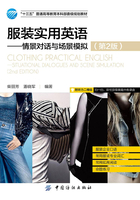
4.Words Differentiation
Clothing, Clothes, Cloth, Apparel, Garment, Costume, Fashion, Wear的词义辨析
(1)Clothing一般指抽象的“衣服”总称,偏重指“衣食住行”中“衣”的意义,以及服装的防护功能。
Some locals offered food and clothing to the refugees.
(2)Clothes侧重于具象的“衣服”,一般指全身的、成套的衣服。
He dressed quickly in casual clothes.
(3)Cloth是“面料”“布料”。
This piece of cloth can be used to make a pair of pillow cases.
(4)Apparel一般指待售的衣服,在商店与商业网站上使用较多。
Textile and apparel exporters in Asia say consumers may feel the pinch with more expensive T-shirts and jeans.
(5)Garment较专业、正式,多用于与服装生产、制作、销售环节有关的场合。
Woolen sweaters can be hand knitted, producing in most cases a finer and less expensive garment.
(6)Costume专指戏剧服装、民族服装等带有一定历史、文化、趣味性的不常见的服装。
The performers, in costume and make-up, were walking up and down back-stage.
(7)Fashion指时尚,偏重时装的“时尚”意味,较抽象。时装设计专业的英文为Fashion Design。
The fabrics are sold wholesale to retailers, fashion houses, and other manu-facturers.
(8)Wear多用作动词,也可当名词使用,特别是在各种服装分类里,常用wear作为后缀,如menswear, womenswear, sportswear, casualwear等,也可用clothing代替,如sports clothing。
The shop stocks an extensive range of beach wear.
Clothing、Clothes、Apparel区别不大,绝大部分场合可以混用。